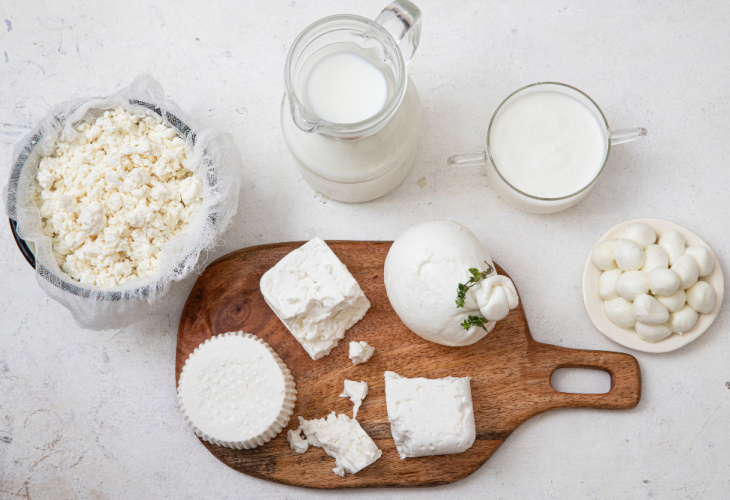Health and Nutrition
Dairy Benefits and Alternatives: How to Get Calcium, Protein, and Probiotics in Your Diet
Explore the top health benefits of dairy products and discover plant-based substitutes for calcium, vitamin D, and digestive support.

Dairy products have been a staple of the human diet for thousands of years, offering a wide range of scientifically-backed nutritional benefits. With the holiday of Shavuot approaching, we explore why consuming dairy can be beneficial and what health advantages dairy products provide.
1. Rich Source of Calcium
One of the most well-known benefits of dairy products is their high calcium content. Calcium is an essential mineral for proper body function, especially for strong bones and teeth. Sufficient calcium intake can help prevent bone diseases like osteoporosis, which primarily affects older adults. For example, one cup of milk can provide about 30% of the recommended daily intake of calcium.
2. High-Quality Protein
Dairy products are a good source of high-quality protein, containing all essential amino acids. Protein is crucial for muscle building, tissue repair, and proper immune function. Especially for those who exercise regularly, milk and its derivatives can be an excellent post-workout protein source.
3. Vitamins and Minerals
In addition to calcium, dairy products also contain important vitamins and minerals such as vitamin D, vitamin B12, potassium, magnesium, and phosphorus. Vitamin D, for example, is vital for calcium absorption in the intestines and for bone health. Vitamin B12 supports nervous system function and red blood cell production. Dairy offers a well-balanced blend of these nutrients.
4. Supports Digestive Health
Fermented dairy products like yogurt and some cheeses contain probiotic bacteria that support a healthy digestive system. These beneficial bacteria can improve digestion, strengthen immunity, and prevent digestive tract infections.
5. Helps Prevent Chronic Diseases
Research indicates that dairy consumption may lower the risk of chronic conditions such as high blood pressure, type 2 diabetes, and heart disease. This may be due to the combination of calcium, potassium, and other compounds working together to promote cardiovascular health.
Dairy products provide numerous health benefits, from supporting bone health to aiding digestion and preventing chronic illnesses. It’s important however to consume them in moderation as part of a balanced diet, and to consult with a dietitian when needed.
Alternatives to Dairy for Those Who Avoid It
Individuals who don’t consume dairy due to lactose intolerance, milk allergies, or personal preference, can find alternatives that offer similar health benefits. It is recommended to consult a dietitian to ensure a balanced and personalized diet plan. These are key substitutes:
1. Plant-Based Sources of Calcium
Green Vegetables: Broccoli, kale, and spinach are rich in calcium. Consistent consumption can provide a substantial portion of your daily calcium needs.
Almonds: A good source of calcium, healthy fats, protein, vitamins, and minerals.
Sesame & Tahini: Very rich in calcium and easily incorporated into many dishes.
2. High-Quality Protein
Legumes: Beans, lentils, chickpeas, and peas offer excellent protein, fiber, iron, and other nutrients.
Soy-Based Products: Tofu and other soy-based foods are complete proteins containing all essential amino acids.
Whole Grains: Quinoa, buckwheat, and oats are examples of grains that provide high-quality protein.
3. Vitamin D
Sunlight Exposure: The body produces vitamin D when skin is exposed to sunlight. Moderate sun exposure can help meet daily needs.
Fortified Foods: Some juices, soy milk, almond milk, and cereals are fortified with vitamin D.
Supplements: In cases of deficiency, vitamin D supplements may be needed under medical guidance.
4. Probiotics for Digestive Health
Fermented Foods: Kefir, sauerkraut, kimchi, and probiotic drinks contain beneficial bacteria for gut health.
Probiotic Supplements: Available in capsule or powder form and provide friendly bacteria to aid digestion.
5. Alternatives for Preventing Chronic Disease
Healthy Fats: Nuts, seeds, avocados, and oils like olive or coconut oil support heart health.
Fruits and Vegetables: A diet rich in produce provides vital vitamins, minerals, and antioxidants that help prevent chronic diseases.
Note: This content does not constitute medical advice or a substitute for professional consultation with a healthcare provider.

